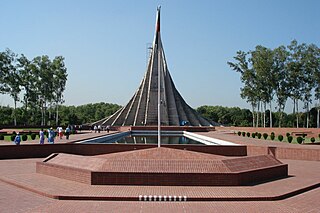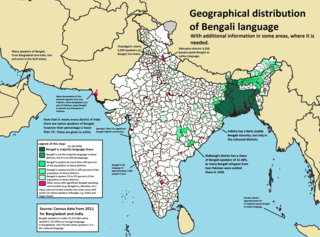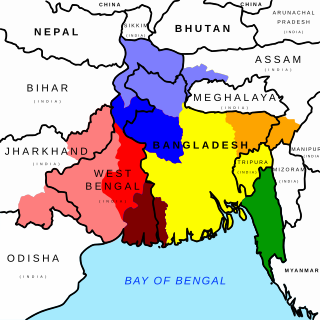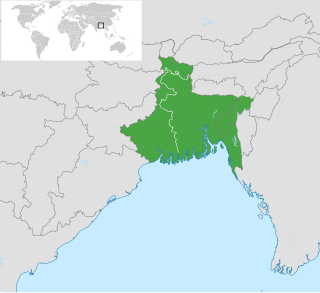Bengali or Bengalee, or Bengalese may refer to:

The music of Bangladesh spans a wide variety of styles. Bangladesh claims some of the most renowned singers, composers and producers in Asia. Music has served the purpose of documenting the lives of the people and was widely patronized by the rulers. It comprises a long tradition of religious and regular song-writing over a period of almost a millennium.

"Amar Sonar Bangla" is the national anthem of Bangladesh. An ode to Mother Bengal, the lyrics were written by Bengali polymath Rabindranath Tagore in 1905, while the melody is derived from Baul singer Gagan Harkara's "Ami Kothay Pabo Tare", set to Dadra tala. The modern instrumental rendition was arranged by Bangladeshi musician Samar Das.

The Baul are a group of mystic minstrels of mixed elements of Sufism and Vaishnavism from different parts of Bangladesh and the neighboring Indian states of West Bengal, Tripura and Assam's Barak Valley and Meghalaya. Bauls constitute both a syncretic religious sect of troubadours and a musical tradition. Bauls are a very heterogeneous group, with many sects, but their membership mainly consists of Vaishnava Hindus and Sufi Muslims. They can often be identified by their distinctive clothes and musical instruments. Lalon Shah is regarded as the most celebrated Baul saint in history.
Bengal is a region in South Asia.

"Bangla Desh" is a song by English musician George Harrison. It was released as a non-album single in July 1971, to raise awareness for the millions of refugees from the country Bangladesh, formerly known as East Pakistan, following the 1970 Bhola cyclone and the outbreak of the Bangladesh Liberation War. Harrison's inspiration for the song came from his friend Ravi Shankar, an Indian-Bengali musician, who approached Harrison for help in trying to alleviate the suffering. "Bangla Desh" has been described as "one of the most cogent social statements in music history" and helped gain international support for Bangladeshi independence by establishing the name of the fledgling nation around the world. In 2005, United Nations Secretary-General Kofi Annan identified the song's success in personalising the Bangladesh crisis, through its emotive description of Shankar's request for help.

The culture of Bengal defines the cultural heritage of the Bengali people native to eastern regions of the Indian subcontinent, mainly what is today Bangladesh and the Indian states of West Bengal and Tripura, where they form the dominant ethnolinguistic group and the Bengali language is the official and primary language. Bengal has a recorded history of 1,400 years. After the partition, Bangladeshi culture became distinct from the mainstream Bengali culture, thus their culture evolved differently, still there are many commonalities in Bangladeshi culture & West Bengali culture which connects them both together as Bengali culture.

There have been numerous works of art created as a result of the Bangladesh Liberation War. In 1971, a concert was organized by members of the British rock band, The Beatles, in support of Bangladesh. The songs recorded for and broadcast on Swadhin Bangla Betar Kendra are still considered to be the best of Bangladeshi protest songs.
Anusheh Anadil is a Bangladeshi musician, artist, cultural activist, and social entrepreneur. The band 'Bangla' was the first female lead band from Bangladesh that became iconically popular in both Bangladesh and West Bengal (India), for their first album Kingkortobbobimuro (2002). Their rendition of spiritual folk songs, along with their own original songs, became a revolution for bringing the sounds of the village bard into popular culture. They helped popularize the philosophy of Fakir Lalon Shai, as a breath of fresh air, to the urban youth. Bangla's second album Prottutponnomotitto (2005) is a tribute to Fakir Lalon Shai. The album questions religious extremism and corrupt politics by using songs of the insightful mystic. The band 'Bangla' inspired many young musicians from both sides of Bengal to rediscover their roots.

Bengali, also known by its endonym Bangla, is an Indo-Aryan language from the Indo-European language family native to the Bengal region of South Asia. With over 250 million native speakers and another 41 million as second language speakers as of 2024, Bengali is the fifth most spoken native language and the seventh most spoken language by the total number of speakers in the world. It is the fifth most spoken Indo-European language.

Joy Bangla is a slogan and war cry used in Bangladesh and in the Indian state of West Bengal to indicate nationalism towards the geopolitical, cultural and historical region of Bengal and Bangamata. It is also recognised as the national slogan of Bangladesh. It translates roughly to "Victory to Bengal" or "Hail Bengal".

Joi Bangla is an EP by Indian sitar virtuoso Ravi Shankar, issued in August 1971 on Apple Records. The recording was produced by George Harrison and its release marked the first in a series of occasional collaborations between the two musicians that lasted until the Chants of India album in 1997. Shankar recorded the EP in Los Angeles, to help raise international awareness of the plight faced by refugees of the Bangladesh Liberation War, in advance of his and Harrison's Concert for Bangladesh shows at Madison Square Garden, New York. Side one of the disc consists of two vocal compositions sung in Bengali, of which the title track was a message of unity to the newly independent nation, formerly known as East Pakistan. The third selection is a duet by Shankar and sarodya Ali Akbar Khan, supported by Alla Rakha on tabla, a performance that presaged their opening set at the Concert for Bangladesh.

Baṅgamātā, Bangla Maa, Mother Bengal or simply বাংলা/ Bangla, is a personification of Bengal conceived during the Bengali Renaissance and later adopted by the Bengali nationalists. In Bengali poetry, literature, culture and patriotic songs, the Mother Bengal represents not only biological motherness but its attributed characteristics as well – protection, never ending love, consolation, care, the beginning and the end of life.

The Sylheti or Sylhetis are an Indo-Aryan ethnocultural group that are associated with the Sylhet region. There are strong diasporic communities in Barak Valley of Assam, India, North Tripura, as well as in rest of Bangladesh and northeast India. They speak Sylheti, an Eastern Indo-Aryan language that is considered "a distinct language by many and a dialect of Bengali by some others".

Bangladesh–Yemen relations are the bilateral relations between Bangladesh and Yemen. In 2014 Mohammad Ashab Uddin was named Bangladeshi ambassador to Yemen.
Bangladeshi English is an English accent heavily influenced by the Bengali language and its dialects in Bangladesh. This variety is very common among Bengalis from Bangladesh.

Bengal is a region in South Asia, politically split between Bangladesh and India. Due to its long history and complicated political divisions, various names have been used to refer to the region and its subsections. The name Bangla is used by both Bangladesh and West Bengal in international contexts. In the Bengali language, the two Bengals each use a different term to refer to the nominally identified nation: Bānglā and Baṅga











